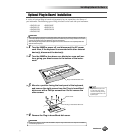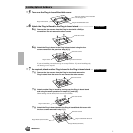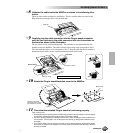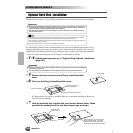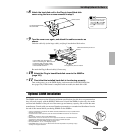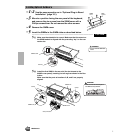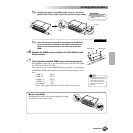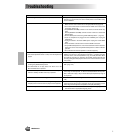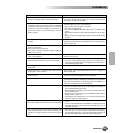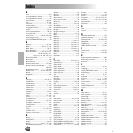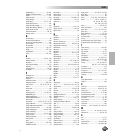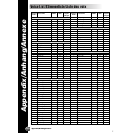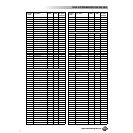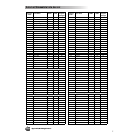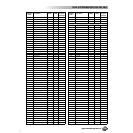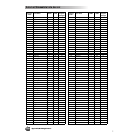
Troubleshooting
Troubleshooting
Reference 189
PROBLEM POSSIBLE CAUSE/SOLUTION
• MIDI data is not transmitted or received via the MIDI A termi-
nals, even when MIDI cables are connected properly.
The MIDI terminals can only be used when the HOST SELECT switch is
set to “MIDI.” All other settings (“Mac,” “PC-1” and “PC-2”) are for direct
transmission/ reception with a computer.
• If you experience distorted or out-of-tune sound from the Vo-
cal Harmony feature, your vocal microphone may be picking
up extraneous sounds (other than your voice) — the Auto Ac-
companiment sound from the 9000Pro, for example. In par-
ticular, bass sounds can cause mistracking of the Vocal
Harmony feature.
The solution to this problem is to ensure that as little extraneous sound as
possible is picked up by your vocal microphone:
• Sing as closely to the microphone as possible.
• Use a directional microphone.
• Turn down the MASTER VOLUME, ACMP volume, or SONG volume
control.
• Separate the microphone from the external speakers as much as possi-
ble.
• Cut the Low band via the 3 Band EQ function in the MIC SETUP display
(page 82).
• When a voice is changed, the previously selected effect is
changed.
This is normal, each voice has its own suitable preset values which are au-
tomatically recalled when the corresponding Voice Set parameters are
turned on (page 163).
• There is a slight difference in sound quality between notes
played on the keyboard.
• Some voices have a looping sound.
• Some noise or vibrato is noticeable at higher pitches, de-
pending upon the voice.
This is normal and is a result of the 9000Pro’s sampling system.
• Some voices will jump an octave in pitch when played in the
upper or lower registers.
Some voices have a pitch limit which, when reached, causes this type of
pitch shift. This is normal.
• The auto-accompaniment chord does not change even when
a different chord is played or the chord is not recognized.
• Are you sure you’re playing on the left-hand section of the keyboard?
• You may be using single-finger type fingering in the fingered mode, or
vice versa. Use the correct type of chord fingering for the selected auto-
accompaniment fingering mode.
• The displayed disk free area value does not coincide with the
actual value.
The displayed value is an approximate value.
• Disk save operations — particularly when saving wave data
to floppy disk — take a long time.
This is normal. It takes approximately 8 minutes to save 1 megabyte of
data to a floppy disk.
• Appropriate harmony notes are not produced by the Vocal
Harmony feature.
Make sure you are using the appropriate method to specify the harmony
notes for the current Vocal Harmony mode. See page 83.
• The voice produces excessive noise. Certain voices may produce noise, depending on the Harmonic Content
and/or Brightness settings of the Mixing Console Filter. This is unavoidable
due to the sound generation and processing system of the 9000Pro. To
avoid noise, change the above mentioned settings.
• The sound is distorted or noisy. • The MASTER VOLUME control may be turned up too high.
• This may be caused by the effects. Try cancelling all unnecessary ef-
fects, especially distortion-type effects.
• Some filter resonance settings in the Custom Voice Creator display can
result in distorted sound.
• Is the gain of the Low band set too high in the Master Equalizer display
(Mixing Console – page 147) ?
• If this applies to the “Sampled” voice , you may have recorded the sam-
ple(s) at too high a level. (See page 84.)
• A strange “flanging” or “doubling” sound occurs.
• The sound is slightly different each time the keys are played.
• Are the R1 and R2 parts set to “ON” and both parts set to play the same
voice?
• If you are routing the MIDI OUT on the 9000Pro to a sequencer and back
to the MIDI IN, you may want to set Local Control (page 175) to “off” to
avoid MIDI “feedback.”
• When a disk is inserted into the disk drive, the [DISK IN USE]
lamp automatically lights and the data starts loading auto-
matically, even though no disk functions have been execut-
ed.
• This is normal and no cause for concern if “FD CACHE” (page 166) has
been set to “ON.” If you do not need the data loaded to cache memory,
you can eject the floppy disk. You can also operate other functions from
the panel without disturbing the automatic cache loading process.
187



